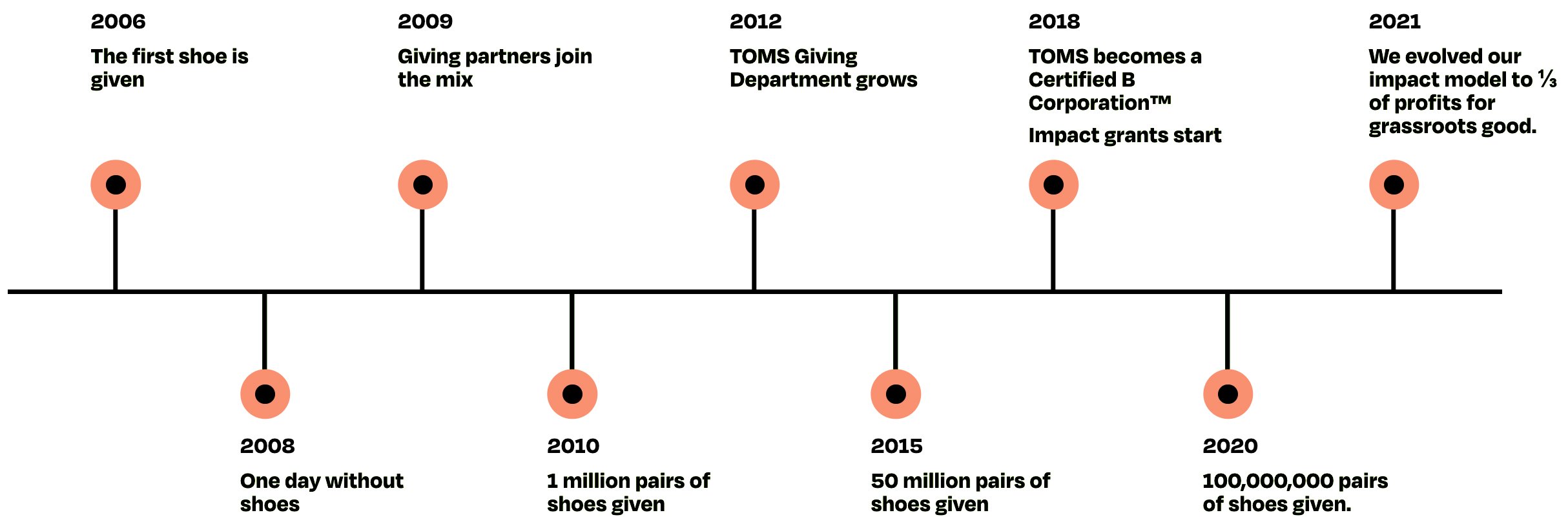
Something started in a Venice Beach apartment in 2006 that took the fashion industry by storm. It was the founding of Toms shoes by Blake Mycoskie. It hit the market with its revolutionary one-for-one giving model.
“When you buy a pair of shoes, we give a pair of shoes to someone in need”. Not only was this a super simple idea, but it was inspiring enough to turn most people, including celebrities, into their fans.
Students of conscious marketing (and purpose marketing) will recognize Tom’s model as one of the most popular examples of attaching charity to product purchases. And it was successful.
Toms rose to fame quickly and between 2010 and 2020, they’d given 99 million pairs of shoes. That translates to 99 million pairs of shoes sold.
A Nielsen report supports this. It revealed that 66% of consumers choose to pay more for products from companies that are committed to positive social impact.
So, if you want to sell well, appeal to a desire. But if you want outstanding sales, appeal to more than one desire. Toms makes comfortable shoes that look great, and then they appeal to the charitable quality inside us.
In this article, we’ll talk about socially conscious marketing, including
- What it is
- Why you need it for a 21st-century business
- How to use it to grow your business
What is Conscious Marketing?
Socially conscious marketing is a type of marketing where businesses build on deeper principles than just profit-making; put the needs, well-being, and desires of their customers at the forefront; and do good for others.
This portrays values that your ideal customers can buy into and help promote your business — making you the reasonable (or emotional) choice to do business with.
The principles are the same as those in conscious capitalism but we’re focusing on the marketing aspect and how that can grow your business.
Code of Ethics for Marketing a Socially Responsible Business
To make your business socially responsible, you need stakeholder integrity, strong leadership, and a purpose.
The purpose gives everyone something to believe in and work towards. Stakeholder integrity makes sure everyone involved actually lives up to that purpose; it isn’t just putting on an image. And a strong leadership builds this into a sustainable culture.
Your purpose should solve a well-established problem, for example, planting trees or using eco-friendly packaging to protect the environment and support breast cancer research. Whatever you choose, there are codes of ethics for using socially conscious marketing that also serve as how-tos (courtesy of the American Marketing Association, AMA):
- HONESTY - When you say you do something in your marketing messages, you have to do it. You’re not going to say you donate 20% of each sale to breast cancer research when you only donate 10% or nothing at all.
- RESPONSIBILITY - Understand how your marketing decisions and practices affect everyone involved — your investors, customers, and community. One way to do this is to make your website accessible to everyone regardless of ability (like we did for our client to make their website WCAG compliant).
- FAIRNESS - You won’t do something illegal or unethical in your marketing practices. For example, leaving bad reviews on competitors’ product pages or spamming a purchased email list with your product offers.
- RESPECT - Show respect to people of all cultures, backgrounds, races, sexual orientations, ages, etc. Don’t use language in your marketing that’s considered offensive or discriminates against anyone — whether they’re your freelance contractors, vendors, suppliers, customers, investors, employees, and partners.
- TRANSPARENCY - Do and tell. Let stakeholders know that you’re making a positive social impact. Tell stories with pictures and videos of the good you’re doing. Show the outcome of your corporate social responsibility (CSR) activities.
- CITIZENSHIP - This is what most believe is the entirety of socially conscious marketing. This encourages fair trade, donating to charities, offsetting environmental impact, and volunteering in your local community. As you’ve seen in 1-5, this is just one part of the equation.
Why is Socially Conscious Marketing Important? (And Where Brands Go Wrong)
Before the 2000s, being socially responsible was a business choice, and marketing about it was just another strategy. But it is vital today as consumers demand it.
Take environmental consciousness, for example, the Nielsen report also revealed that products using eco-friendly packaging were a purchase driver for 41% of respondents. And that’s not all. Brands with a demonstrated commitment to sustainability had their sales grow 4 times faster than other brands.
Consumers want to do business with companies that care. But diving into socially conscious marketing can be risky. You want to avoid divisive political topics that can cause some backlash.
Remember Pepsi’s ad referencing police brutality and the Black Lives Matter movement? That didn’t go well because they made it seem like a can of Pepsi could end the African American community's pain.
Keep your socially conscious marketing messages authentic and considerate. Avoid controversial topics if you can’t find safe ground. Or work with a non-profit that already has an established message, purpose, and process.










